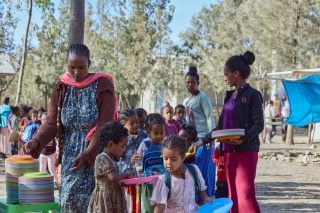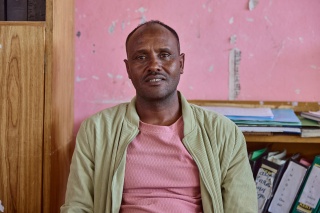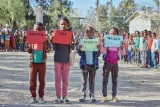
When Hunger Is Everywhere, School Meals Are Hope
Mary’s Meals began serving in Beati Akor Primary School many years ago, but a lot has happened since then.
Beati Akor is not your average primary school. Before the war, which wreaked havoc in this part of Ethiopia, it stood as a shining example for other schools; the head teacher’s office filled with trophies and medals celebrating the students’ achievements. Miraculously, those medals remain, but look a little closer and you’ll see the school building itself carries the scars of war – bullet holes in the walls, windows senselessly smashed, and the gates bent at odd angles from where soldiers demanded entry.
It's here you’ll find Letebrhan, a self-conscious and anxious 15-year-old who still manages to find the courage to share her story of what happened here.
Letebrhan should really have left primary school years ago, but the Covid-19 pandemic and the war that followed – combined with the very real hunger in her family – has meant she’s not yet been able to complete her primary education. This is despite the obvious signs that this bright young woman is more than ready academically. Things at home aren’t easy for Letebrhan. During the war, her eldest sibling left to join the fighting and hasn’t been seen since; the family have heard no information or updates and fear he must have died. Letebrhan lives at home with her parents and four remaining siblings. Her father is very ill and is no longer able to provide for the family. Her mother tries to find work when she can but it’s not easy.

A Harsh Environment
The area surrounding Beati Akor Primary School is initially encouraging: there is a river, albeit a shallow one, and even some small greenery alongside its edge. But you soon learn that any land that would be suitable for farming is too far away from the riverbank, and the technology which might help harvest the water efficiently isn’t here. As a result, those with small patches of land along the river are only allowed to take water during allocated – and very limited – windows of time. Very few farmers benefit and so the yields are extremely low, not even enough to feed the farmers’ families.
Occasionally, there would be work available in those small fields and it’s this that Letebrhan’s mother would seek out, in the hope of some small payment she could use to feed her own family. Her job was to clean out the small stones from the cereals to prepare them for the grinding process. It’s hard manual labor but sometimes Letebrhan would go and help her. Other times she would stay behind to help with the household chores. Whether working at home or in the field with her mother, Letebrhan’s thoughts were always on school.
Before the conflict, it was much easier for her to focus on education. She says: “Before the conflict the school was very interesting, it was very good, but after the war everything was changed. It was difficult. There were a lot of community members that were displaced.
“We were just trying to come to school, even in the conflict time, but the community was afraid of the bombardments from the air and of drones, so we were displaced with our families far from this community. Our teachers tried to come together and cover some subjects but their salaries were stopped and so even some of the teachers were displaced at that time.
“It is even a very big challenge in our house because there is not enough food. There is a lot of hunger and suffering because of the shortage of food. Many of our community members are really suffering and we share this challenge. Before the feeding started [back], a lot of students dropped out [of school] and were absent, including me. The reason why the students were absent was because of hunger, the shortage of food. So, they aren’t able to come to school.
“Here it is not only the drought and the conflict but so many households from our area were looted by the soldiers so we are affected. Even some kids my age went to the soldiers, going through their camps, to beg for bread.
“I have never seen such type of difficulties in the community, or in my family. Because before the war there was enough support, there was enough agriculture production. This situation is the worst one.
“I feel like most of the people including me, we minimize our meals. There is not enough food, there is huge scarcity, we minimize everything.
It is clear that if there is not enough food at home, it is difficult to attentively attend in class, it can be so tiring, it just feels like you are so tired.”
A Daily Struggle for Survival
Letebrhan’s family face a daily struggle in the face of Tigray’s devastating hunger crisis. However, there are signs of hope that shine through, and they come in the form of daily platefuls of school meals. Since the war ended, the Mary’s Meals school feeding program has returned to Beati Akor Primary School and with it, so have the children.

The school principal Tsegay Mehari attributes the dramatic increase in enrollment to the daily meals we are providing there. Before the conflict, the school had around 730 pupils, but Principal Mehari says that decreased dramatically when the feeding program had to stop: “During the conflict, the feeding program was closed, [our school enrolment] decreased to 261. After the conflict it started back again, then the number of the students highly increased, now we have 1,177 students in total here. This is the result of the feeding.”
Letebrhan agrees, saying:
“I am very happy to join the school because education is very important to me, and to my friends. But I think the education is so important because of the feeding. Because of the feeding a lot of children like me are coming here.
“I can’t imagine how it would be if the feeding stopped. But I think many of the children would be absent from school because there is huge hunger in the area. I am rarely absent from school. Sometimes I try to help my mother, but mostly I just prioritize to attend school.”
This is the impact of Mary’s Meals’ school feeding program on Letebrhan and her classmates – they feel able to prioritize their education again, and they know they will be able to eat at least one meal in a day.
Easing Parents’ Burdens With the Promise of a Daily Meal
Tigray is in the midst of a hunger crisis; families face a desperate struggle to survive. When there is a promise of a school meal, parents feel the burden of having to feed their children is eased. The fear about whether they might even survive this looming famine is reduced. The incentive and motivation to attend school is as clear as the need for the hot grains of maize that cook in the Mary’s Meals kitchens every morning.
Getting children into school is essential for the recovery of Tigray and for building a prosperous future for these communities. Principal Mehari doesn’t hold back on his ambition to get his school back to its pre-war reputation as a center of excellence, saying:
“Our hope is to make this school a role model, not only for this country, but an international model school, a high-performance school of achievement. We will try to be successful.”
For Letebrhan, her hopes are building too. She confides:
“I hope things can change and there can be a better situation for the future, so that the levels of hunger and the starvation in the area are minimized. I hope it can be good.”
Thank you for everything you are doing to support the school feeding program in Tigray. Please, continue to give what you can to help us keep our promise to Letebrhan and her schoolmates in Beati Akor Primary School, and to reach all the children who are still waiting for Mary’s Meals. Your support is reaching children who are desperately in need of those platefuls of school meals, and the hope that they represent.



